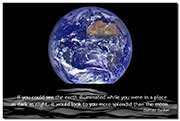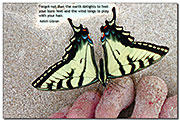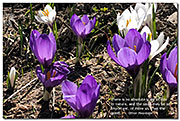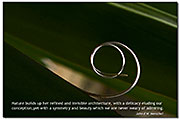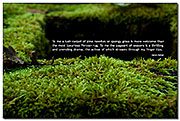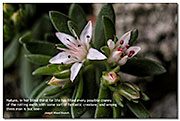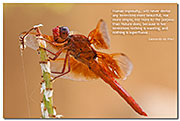Nature G-L
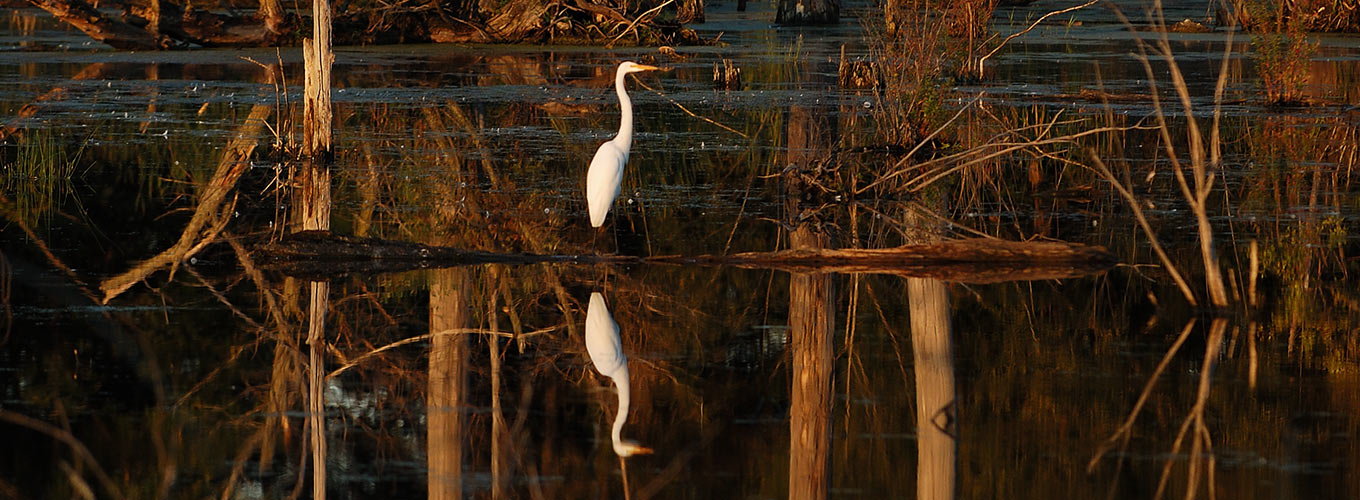
Nature Quotes G-L For other pages, click the links below
The sun, with all those planets revolving around it and dependent on it, can still ripen a bunch of grapes as if it had nothing else in the universe to do. – Paraphrase of the following from Day 3: “For when the sun draws up some vapors here, or warms a plant there, it draws these and warms this as if it had nothing else to do. Even in ripening a bunch of grapes, or perhaps just a single grape, it applies itself so effectively that it could not do more even if the goal of all its affairs were just the ripening of this one grape.”
Galileo Galilei (1564-1642) – Discourses and Mathematical Demonstrations Relating to Two New Sciences, discourse from the Third Day, spoken by Salviati. 1638
Nature . . . is inexorable and immutable; she never transgresses the laws imposed upon her, nor cares a whit whether her abstruse reasons and methods of operations are understandable to men.
Galileo Galilei (1564-1642) Essay in response to the Grand Duchess Christina, Quoted in Aspects of Western Civilization: Problems and Sources in History, ed Rodgers, 1988.
If you could see the earth illuminated when you were in a place as dark as night, it would look to you more splendid than the moon.
Galileo Galilei (1564-1642) – “Dialogue concerning the Two Chief World Systems,” 1632, Salviati p 88
Gallery of Nature Quotes
More and more Americans feel threatened by runaway technology, by large-scale organization, by overcrowding. More and more Americans are appalled by the ravages of industrial progress, by the defacement of nature, by man-made ugliness. If our society continues at its present rate to become less livable as it becomes more affluent, we promise all to end up in sumptuous misery.
John William Gardner (1912–2002) ,No Easy Victories, ed. Helen Rowan, p. 57 (1968)
The attraction of variety, contrast, is always invigorating. Nature does not for long allow a sameness of beauty too prevail.
Virginia Garland – “The Rain,” Out West A Magazine of the Old Pacific and the New, Volumes 27-28, 1907 Land of Sunshine Publishing Company, Vol 28, p141.
Forget not that the earth delights to feel your bare feet and the wind longs to play with your hair.
Kahlil Gibran – The Prophet, On Clothes Discourses and Mathematical Demonstrations Relating to Two New Sciences
Gallery of Nature Quotes
The flower is the poetry of reproduction. It is an example of the eternal seductiveness of life.
Jean Giraudoux (1882-1944) – The Enchanted, Act 1, (1933)
Whatever Nature undertakes, she can only accomplish it in a sequence. She never makes a leap.
Johann Wolfgang von Goethe (1749-1832) – Jeremy Naydler (ed.), Goethe On Science: An Anthology of Goethe’s Scientific Writings (1996), 60.
Nothing is more consonant with Nature than that she puts into operation in the smallest detail that which she intends as a whole.
Johann Wolfgang von Goethe (1749-1832)- Jeremy Naydler (ed.), Goethe On Science: An Anthology of Goethe’s Scientific Writings (1996), 59.
Nature does not suffer her veil to be taken from her, and what she does not choose to reveal to the spirit, thou wilt not wrest from her by levers and screws.
Johann Wolfgang von Goethe (1749-1832) “The Experiment as Mediator Between Subject and Object” (1792/1823), in Goethe On Science: An Anthology of Goethe’s Scientific Writings, edited by Jeremy Naydler (1996), p. 45
In Nature we never see anything isolated, but everything in connection with something else which is before it, beside it, under it, and over it.
Johann Wolfgang von Goethe (1749-1832) – Conversations of Goethe with Eckermann and Soret, TR John Oxenford, London, 1883, p156
Nature! We are enveloped and embraced by her, incapable of emerging from her and incapable of entering her more deeply. Unbidden and unwarned, she receives us into the circuits of her dance, drifting onward with us herself, until we grow tired and drop from her arms.
Variant: NATURE! We are surrounded and embraced by her: powerless to separate ourselves from her, and powerless to penetrate beyond her. Without asking, or warning, she snatches us up into her circling dance, and whirls us on until we are tired and drop in her arms.
Johann Wolfgang von Goethe (1749-1832) – (Schriften zur Natur- und Wissenschaftslehre, “Fragment über die Natur;” GA 16: 921-922) Variant: Goethe’s “Reflections on Nature”, Translated by T.H. Huxley. Published in an introductory article to the first number of Nature, dated Nov. 4, 1869.
But there is no trifling with nature; it is always true, grave, and severe; it is always in the right, and the faults and errors fall to our share. It defies incompetency, but reveals its secrets to the competent, the truthful, and the pure.
Johann Wolfgang von Goethe (1749-1832) – Goethe’s opinions on the world, mankind, literature, science, and art, Tr. Otto Wenckstern, 1853, p 63. Attributed to Goethe, but not found in any of his original German texts. Possible paraphrase or mis-attribution. Extensive review of his authenticated works—including Maximen und Reflexionen, his scientific writings, and German primary sources—shows no evidence that he ever wrote or said it. The attribution appears to be apocryphal.
Nature is the living, visible garment of God.
Johann Wolfgang von Goethe (1749-1832) –Faust – Eine Tragödie(1808), spoken by Faust in his monologue
Nature has formed nothing that does not consume itself, and every object near it: so that, surrounded by earth and air, and all the active powers, I wander on my way with aching heart; and the universe is to me a fearful monster, for ever devouring its own offspring.
Johann Wolfgang von Goethe (1749-1832) –The Sorrows of Young Werther,” Tr R.D. Boylan, book I, August 18, PROJECT GUTENBERG EBOOK 2527
Nature goes her own way, and all that seems an exception is really according to order.
Johann Wolfgang von Goethe (1749-1832) – in Johann Peter Eckermann, Conversations with Goethe, Thursday, December 9, 1824, (p. 75), J.M Dent & Sons, England, 1970
Assuredly there is no more lovely worship of God than that for which no image is required, but which springs up in our breast spontaneously when nature speaks to the soul, and the soul speaks to nature face to face.
Johann Wolfgang von Goethe (1749-1832) – Originally from Wilhelm Meister’s Journeyman Years (1821-1829) later republished in the The Wisdom of Goethe, ed Blackie, 1883, p187
Nature knows no pause in progress and development, and attaches her curse to all inaction.
Johann Wolfgang von Goethe (1749-1832) – Die Aphorismen uber Naturwissenschaft – Werke, band 50, section 4.
Nature! We live in her midst and know her not. She is incessantly speaking to us, but betrays not her secret. We constantly act upon her, and yet have no power over her. Variant: NATURE! We are surrounded and embraced by her: powerless to separate ourselves from her, and powerless to penetrate beyond her.
Johann Wolfgang von Goethe (1749-1832) -“Nature: Aphorisms by Goethe,” Nature, Vol. 1, Thursday, November 4, 1869, tr Thomas Huxley, p. 9.
The spectacle of Nature is always new, for she is always renewing the spectators. Life is her most exquisite invention; and death is her expert contrivance to get plenty of life.
Johann Wolfgang von Goethe (1749-1832) -“Nature: Aphorisms by Goethe,” Nature, Vol. 1, Thursday, November 4, 1869, tr Thomas Huxley, p. 9. Reprinted in
As you sit on the hillside, or lie prone under the trees of the forest, or sprawl wet-legged on the shingly beach of a mountain stream, the great door, that does not look like a door, opens.
Stephen Graham – The Gentle art of Tramping (1926), p108.
A society grows great when old men plant trees whose shade they know they shall never sit in.
Greek Proverb
Sometimes nature guards her secrets with the unbreakable grip of physical law. Sometimes the true nature of reality beckons from just beyond the horizon.
Brian Greene (1963 – ) – NYT Op Ed, “Darkness on the Edge of the Universe, January 15, 2011
For all Nature is as one Great Engine, made by, and held in His Hand.
Nehemiah Grew (1641-1712) – The Anatomy of Plants With an Idea of a Philosophical History of Plants and Several Other Lectures Read Before the Royal Society, 1682, p. 80.
In the spangled sky, the rainbow, the woodland hung with diamonds, the sward sown with pearly dew, the rosy dawn, the golden clouds of even, the purple mountains, the hoary rock, the blue boundless main, Nature’s simplest flower, or some fair form of laughing child or lovely maiden, we cannot see the beautiful without admiring it.
Thomas Guthrie (1803-1873) – The Way to Life, E.B.Treat & company (1891)
Mountains are earth’s undecaying monuments.
Nathaniel Hawthorne (1804-1864), Sketches from Memory, “The Notch of the White Mountains,” From Mosses from an Old Manse, 1846 18654.
Perhaps, if we could penetrate nature’s secrets, we should find that what we call weeds are more essential to the well being of the world than the most precious fruit or grain.
Nathaniel Hawthorne (1804-1864) ” Friday, June 23,” Passages from the American Note-Books, 1843, p353.
I know nothing in the visible world that combines splendor and purity so perfectly as a great mountain entirely covered with frozen snow and reflected in the vast mirror of a lake.
Philip Hamerton (1834-1894), Landscape, London: Seeley & Co., 1885, p182.
There are occasions when you can hear the mysterious language of the Earth, in water, or coming through the trees, emanating from the mosses, seeping through the undercurrents of the soil, but you have to be willing to wait and receive.
John Hay (1916-2011) – The Immortal Wilderness, Norton & Co., NY, NY, 1987
We do not see nature with our eyes, but with our understandings and our hearts.
William Hazlitt (1778-1830) – Thoughts on Taste,” Edinburgh Magazine, (October 1818), reprinted in The Collected Works of William Hazlitt (1902-1904)
…there is no absolute scale of size in the Universe, for it is boundless towards the great and also boundless towards the small.
Oliver Heaviside (1850-1925) – Quoted by D’Arcy Wentworth Thompson in On Growth and Form, Volume 1, Revised Edition, Dover, NY, 1992, p.24
Gallery of Nature Quotes
Nature, like a true poet, abhors abrupt transitions.
Heinrich Heine (1797-1856) – The German Classics of the Nineteenth and Twentieth Centuries (vol 6), Tr Leland, The German Publication Society, NY, 1913-1914, p. 73.
Like a great poet, Nature produces the greatest results with the simplest means. These are simply a sun, trees, flowers, water and love. Of course, if the spectator be without the last, the whole will present but a pitiful appearance, and in that case, the sun is merely so many miles in diameter, the trees are good for fuel, the flowers are classified by stamens, and the water is simply wet.
Heinrich Heine (1797-1856) – Scintillations from the Prose Works of Heinrich Heine, “Miscellaneous,” Henry Holt & Co, Ny, 1873, p169.
It is good to remember that the laws of the universe recognize no favorites and cherish no hostility or small vindictiveness; that before sun and rain, stormy winds, or summer’s kind beneficence, we all stand upon one common level.
Caroline Henderson (1877-1966) – Letters from the Dust Bowl, ed Alvin Turner, University of Oklahoma Press, 2001, p. 161
How difficult it is for some of us to learn that the results we must leave to the great silent unseen forces of Nature, whether the crop be corn or character.
Caroline Henderson (1877-1966) – Letters from the Dust Bowl, ed Alvin Turner, University of Oklahoma Press, 2001, p. 67.
…Nature builds up her refined and invisible architecture, with a delicacy eluding our conception, yet with a symmetry and beauty which we are never weary of admiring.
John F.W. Herschel (1792-1871) – A Preliminary Discourse on the Study of Natural Philosophy: The Cabinet of Natural Philosophy, London, 1851, p263
Gallery of Nature Quotes
The Amen! of Nature is always a flower.
Oliver Wendell Holmes (1809-1894) – The Autocrat of the Breakfast-table, Ch X, p255, J.M. Dent & Co, Boston, MA, 1907
Nature has but one judgment on wrong conduct—if you can call that a judgment which seemingly has no reference to conduct as such—the judgment of death.
Oliver Wendell Holmes (1809-1894) – Address at the dedication of the Northwestern University Law School Building, Chicago, Illinois, October 20, 1902.—Holmes, Collected Legal Papers, p. 272 (1937).
There is a way that nature speaks, that land speaks. Most of the time we are simply not patient enough, quiet enough, to pay attention to the story, to be attentive.
Linda Hogan (1947 – ) – Jensen, Derrick, Listening to the Land, Chelsey Green Publishing Co, 2004, p 124.
Naturam expellas furca, tamen usque revenit.
You can drive nature out with a pitchfork, she will nevertheless come back.
Horace (65-8 BC), Epistles I.X.24
Nature is always lavish of her gifts even to the most insignificant forms. The butterflies and moths are richly dowered in this respect.
J. Horner– “The Clothes’ Moth,” Our Corner, Vol 4, No. 1, July 1884 ed Annie Besant , p40. Improperly attributed to Annie Besant in Gather’s Dictionary of Scientific Quotations.
The mountains, the forest, and the sea, render men savage; they develop the fierce, but yet do not destroy the human.
Victor Hugo (1802-1885) – “Fantine,” Les Miserables, 1862, 2:6, tr Charles E. Wilbour
God manifests himself to us in the first degree through the life of the universe, and in the second degree through the thought of man. The second manifestation is not less holy than the first. The first is named Nature, the second is named Art.
Dieu se manifeste à nous au premier degré à travers la vie de l’univers, et au deuxième degré à travers la pensée de l’homme. La deuxième manifestation n’est pas moins sacrée que la première. La première s’appelle la Nature, la deuxième s’appelle l’Art.
Victor Hugo (1802-1885) – William Shakespeare (1864)Part I, Book II, Chapter I [5]
It is a great mortification to the vanity of man, that his utmost art and industry can never equal the meanest of nature’s productions, either for beauty or value. Art is only the under-workman, and is employed to give a few strokes of embellishment to those pieces, which come from the hand of the master.
David Hume (1711-1776) – Essays, Moral, Political, and Literary, 1741-2; 1748, Essay 15, The Epicurean
Colors are the smiles of nature. When they are extremely smiling, and break forth into other beauty besides, they are her laughs, as in the flowers.
Leigh Hunt (1784-1859) The Seer, or Common-Places Refreshed, Vol i, Boston, Roberts Brothers, 1864, p36-37.
Listen to nature’s voice—it contains treasures for you.
Huron Tribe proverb
Sit down before fact as a little child, be prepared to give up every preconceived notion, follow humbly wherever and to whatever abysses nature leads, or you shall learn nothing. I have only begun to learn content and peace of mind since I have resolved at all risks to do this.
Thomas Henry Huxley (1825-1895) – Letter to Charles Kingsley (1860) after the death of Huxley’s son.
The chess-board is the world, the pieces are the phenomena of the universe, the rules of the game are what we call the laws of Nature. The player on the other side is hidden from us. We know that h is play is always fair, just and patient. But also we know, to our cost, that he never overlooks a mistake or makes the smallest allowance for ignorance.
Thomas Henry Huxley (1825-1895) – (A Liberal Education and Where to Find It, 1868)
To a person uninstructed in natural history, his country or seaside stroll is a walk through a gallery filled with wonderful works of art, nine-tenths of which have their faces turned to the wall.
Thomas Henry Huxley (1825-1895) – On the Educational Value of the Natural History Sciences” (1854)
Grass is the forgiveness of nature – her constant benediction. Forests decay, harvests perish, flowers vanish, but grass is immortal…Its tenacious fibers hold the earth in place and prevent its soluble components from washing to the wasting sea.
John J. Ingalls (1833-1900) – Cited in Forever the Land; A country chronicle and anthology by Russel and Kate Lord, Harper and Brothers, NY, 1950.
In nature, there are neither rewards or punishments; there are consequences.
Robert Greene Ingersoll – “The New Testament, Some Reasons Why, 1881, pt. 8 (ch.8, p. 185).
Nature seems to delight in disappointing the assiduities of art, with which it would rear legitimate dullness to maturity; and to glory in the vigor and luxuriance of her chance productions.
Washington Irving (1783-1859) – The Sketch-Book of Geoffrey Crayon, Gent, “Roscoe,” Philadelphia: Lippincott, , 1872, p. 23.
He who would study nature in its wildness and variety, must plunge into the forest, must explore the glen, must stem the torrent, and dare the precipice.
Washington Irving (1783-1859) – The Sketch-Book of Geoffrey Crayon, Gent, “Philip of Pokanoket,” Philadelphia: J.B. Lippincott 1872, p328. .
All the pictures which science now draws of nature and which alone seem capable of according with observational fact are mathematical pictures…From the intrinsic evidence of his creation, the Great Architect of the Universe now begins to appear as a pure mathematician.
Sir James Hopwood Jeans (1877-1946) – The Mysterious Universe, Cambridge University Press, 1930, p140
How sublime to look down on the workhouse of nature, to see her clouds, hail, snow, rain, thunder, all fabricated at our feet!
Thomas Jefferson (1743-1826) – Letter to Maria Cosway, Oct. 12, 1786, in The Papers of Thomas Jefferson, Boyd, et al eds, Princeton: Princeton University Press, 1950 – 33 vols, 10: 447.
The movements of nature are in a never ending circle. The animal species which has once been put into a train of motion, is still probably moving in that train. For if one link in nature’s chain might be lost, another and another might be lost, till this whole system of things should evanish by piece-meal; a conclusion not warranted by the local disappearance of one or two species of animals, and opposed by the thousands and thousands of instances of the renovating power constantly exercised by nature for the reproduction of all her subjects, animal, vegetable, and mineral.
Thomas Jefferson (1743-1826) -Address to The American Philosophical Society: “A Memoir on the Discovery of Certain Bones of a Quadruped of the Clawed kind in the Western parts of Virginia,” Transactions of the American Philosophical Society, 4 (1799), 255-56.
The general desire of men to live by their heads rather than their hands, and the strong allurements of great cities to those who have any turn for dissipation, threaten to make them here, as in Europe, the sinks of voluntary misery.
Thomas Jefferson (1743-1826) – “Letter to David Williams, November 14, 1803,” Letters and Addresses of Thomas Jefferson, Ed. Parker and Viles, NY, (1908) p160.
Nature never gives everything at once.
Samuel Johnson (1709-1784) – A Journey to the Western Islands of Scotland, Vol 1, Dublin, 1775, 70.
Never does nature say one thing and Wisdom another. Variant: Wisdom and Nature! are they not the same? Variant: Nature and Wisdom always speak alike.
Nunquam aliud Natura, aliud Sapientia dicit
Juvenal (Late First – Early 2nd Cent. AD) – Satires XIV:303-331 – Avarice is not a Family Value
The poetry of earth is never dead.
John Keats (1795-1821) – Sonnet. On the Grasshopper and the Cricket
To me a lush carpet of pine needles or spongy grass is more welcome than the most luxurious Persian rug. To me the pageant of seasons is a thrilling and unending drama, the action of which streams through my finger tips.
Helen Keller (1880-1968) – “Three Days to See,” January, 1933, The American Idea: The Best of the Atlantic Monthly
Gallery of Nature Quotes
I know no study that will take you nearer the way to happiness than the study of nature – and I include in the study of nature not only things and their forces, but also mankind and their ways, and the molding of the affections and the will into an earnest desire not only to be happy, but to create happiness.
Helen Keller (1880-1968) – “The Simplest Way to be Happy,” Home magazine, Feb, 1933.
I am thankful that in a troubled world no calamity can prevent the return of spring.
Helen Keller (1880-1968) – Letter to Mrs. Felix [Carrie] Fuld, May 10, 1933
Nature uses as little as possible of anything.
Johannes Kepler (1571-1630) – Viking Book of Aphorisms: A Personal Selection (1920) by W. H. Auden and Louis Kronenberger, Penguin, 1962 p. 98. Attributed, but not verified.
At the same time that she [nature] solicits him [man] to follow her not only into her open walks, but likewise to explore her secret recesses, she — fails not to reward him with the purest gratifications of the mind, because at every step he takes, new instances of beauty, variety, and perfection are unfolded to his view.
Henry Kett (1761-1825) – Elements of General Knowledge, Vol 2, Chapter IV, Bronson, Philadelphia, 1805, p 89.
Nature is hieroglyphic. Each prominent fact in it is like a type; its final use is to set up one letter of the infinite alphabet, and help us by its connections to read some statement or statute applicable to the conscious world.
Thomas Starr King (1824-1864) – The White Hills, their legends, landscape, and poetry, 1860, p394.
Nature’s deepest laws, her own true laws, are her invisible ones.
Charles Kingsley (1819-1875) – Alton Locke, Chapter XVIII, Macmillan & Co., London, 1862, p. 143.
Madame Nature allows no dangerous classes, in the modern sense. She has, doubtless for some wise reason, no mercy for the weak. She rewards each organism according to its works; and if anything grows too weak or stupid to take care of itself, she gives it its due deserts by letting it die and disappear.
Charles Kingsley (1819-1875) – Scientific Essays and Lectures on Bio-Geology, MAcmillan & Co. (1880) p3
Nature is garrulous to the point of confusion, let the artist be truly taciturn.
Paul Klee (1879-1940) – The diaries of Paul Klee 1898-1918, no. 857 (1957: tr 1965). 1909 entry.
Only those within whose own consciousness the sun rise and set, the leaves burgeon and wither, can be said to be aware of what living is.
Joseph Wood Krutch (1893-1970) – “March,” The Twelve Seasons, 1949
The famous balance of nature is the most extraordinary of all cybernetic systems. Left to itself, it is always self-regulated.
Joseph Wood Krutch (1893-1970) – “Wilderness as a Tonic, Saturday Review, June 8, 1963.
Nature takes no account of even the most reasonable of human excuses.
Joseph Wood Krutch (1893-1970) – “The Paradox of Humanism,” The Modern Temper, 1929
Nature, in her blind thirst for life has filled every possible cranny of the rotting earth with some sort of fantastic creature, and among them man is but one—perhaps the most miserable of all, because he is the only one in whom the instinct of life falters long enough to enable it to ask the question “Why?”
Joseph Wood Krutch (1893-1970) – “The Genius of Mood,” The Modern Temper: A Study and a Confession, 1929, p7.
Gallery of Nature Quotes
To those who study her, this Nature reveals herself as extraordinarily fertile and ingenious in devising means, but she has no ends which the human mind has been able to discover or comprehend.
Joseph Wood Krutch (1893-1970) – The Modern Temper, Chapter Two, Section iii, Harcourt, Brace & Co., NY, NY, 1929, p. 27
When a man wantonly destroys one of the works of man, we call him Vandal. When he wantonly destroys one of the works of god, we call him Sportsman.
Joseph Wood Krutch (1893-1970) – “The Vandal and the Sportsman,” The Great Chain of Life, 1956, University of Iowa Press Edition 2009, p 148.
Nature is a catchment of sorrows.
Maxine Kumin (1925 -2014) – Nurture: poems, Penguin Books, 1989.
When a man moves away from nature his heart becomes hard.
Lakota Tribe Proverb
Nature speaks little. Hence a Squall lasts not a whole morning. A rainstorm continues not a whole day.
Laozi (Lao Tzu) (570 – 490 BCE) – Tao Te Ching, A New Translation with Commentary, Tr. E. Chen, Paragon House, 1989, p113.
Nature is not benevolent: with ruthless indifference she makes all things serve their purposes….
Laozi (Lao Tzu) (570 – 490 BCE) – The Sayings of Lao Tzu, Tr. Lionel Giles, London, Orient Press, 1904, p43.
All things in Nature work silently. They come into being and possess nothing. They fulfil their functions and make no claim.
Laozi (Lao Tzu) (570 – 490 BCE) – The Wisdom of the East, The Sayings of Lao Tzu, Tr Giles, Orient Press, 1904, p33.
Where there is much pretension, much has been borrowed; nature never pretends.
Johann Caspar Lavater (1741-1801) – Aphorisms on Man, 3rd Ed. London, 1794, no. 545.
In the study of the sciences which depend on mathematics, those who do not consult nature, but authors, are not the children of nature; they are only her grandchildren. Nature alone is the master of true genius.
Leonardo da Vinci (1452-1519) – Quoted in The life of Sir Isaac Newton, David Brewster, Ch XVIII (p. 295), J. & J. Harper, NY, NY, 1833. Footnote references: Essai sur les Ouvrages physico-mathematiques de Leonard de Vinci, par J.B. Venturi, Paris, 1799
Necessity is the mistress and guide of Nature. Variant: Necessity is the theme and the inventress, the eternal curb and law of Nature.
Leonardo da Vinci (1452-1519) – The Literary Works of Leonardo da Vinci, Jean Paul Richter, Philosophical Maxims, 1135, p 237, University of California Press, Berkley, CA, 1977
Nature varies the seed according to the variety of the things she desires to produce in the world.
Leonardo da Vinci (1452-1519) – The Notebooks of Leonardo da Vinci, Vol I, 1207.
Human ingenuity…will never devise any inventions more beautiful, nor more simple, nor more to the purpose than Nature does; because in her inventions nothing is wanting, and nothing is superfluous . . .
Leonardo da Vinci (1452-1519) – The Notebooks of Leonardo da Vinci I, 837, translated by Jean Paul Richter, London, 1888, Gutenberg.org.
Gallery of Nature Quotes
The eye, which is called the window of the soul, is the principal means by which the central sense can most completely and abundantly appreciate the infinite works of nature; and the ear is the second, which acquires dignity by hearing of the things the eye has seen.
Leonardo da Vinci (1452-1519) – The Notebooks of Leonardo da Vinci, IX, 653.
Nature never breaks her laws.
Also: Nature is constrained by the order of her own law which lives and works within her.
Leonardo da Vinci (1452-1519) -First Quote: Thoughts on Art and Life, Translated by Maurice Baring, Merrymount Press, Boston, MA, 1906 / Second Quote, Leonardo da Vinci’s Notebooks, Book 1, Life, p 55.
Nature is constrained by the cause of her laws which dwell inborn in her. Variant: Nature is constrained by the order of her own law which lives and works within her.
Leonardo da Vinci (1452-1519) – Thoughts on Art and Life, “Thoughts on Science,” Translated by Maurice Baring, Merrymount Press, Boston, MA, 1906
Water is the driver of nature.
Leonardo da Vinci (1452-1519) – Thoughts on Art and Life, Translated by Maurice Baring, 1906, #53, 164.
Bountiful nature has provided that in all parts of the world you will find something to imitate.
Leonardo da Vinci (1452-1519) – Thoughts on Art and Life, Translated by Maurice Baring, 1906, #7, p9.
In nature there is no effect without a cause; once the cause is understood there is no need to test it by experience. Variant: There is no result in nature without a cause; understand the cause and you will have no need of the experiment.
Leonardo da Vinci (1452-1519) – The Literary Works of Leonardo da Vinci, Jean Paul Richter, Philosophical Maxims, 1148B, p 239, University of California Press, Berkley, CA, 1977
Nature is full of infinite causes which were never set forth in experience. Variant: Nature is full of infinite causes which are beyond the poale of experience.
Leonardo da Vinci (1452-1519) – The Notebooks of Leonardo da Vinci, I, ch 1, tr. Edward MacCurdy, 1955, p.72..
Every action done by nature is done in the shortest way.
Leonardo da Vinci (1452-1519) – The Notebooks of Leonardo da Vinci, I, ch 1, tr. Edward MacCurdy, 1955, p.73.. See also the following quote.
Given the cause nature produces the effect in the briefest manner that it can employ.
Leonardo da Vinci (1452-1519) – The Notebooks of Leonardo da Vinci, I, ch 1, tr. Edward MacCurdy, 1955, p.77.
Our ability to perceive quality in nature begins, as in art, with the pretty. It expands through successive stages of the beautiful to values as yet uncaptured by language.
Aldo Leopold (1887-1948) – Forward to A Sand County Almanac, Oxford University Press, 1949
Like winds and sunsets, wild things were taken for granted until progress began to do away with them. Now we face the question whether a still higher ‘standard of living’ is worth its cost in things natural, wild and free.
Aldo Leopold (1887-1948) – Forward to A Sand County Almanac, Oxford University Press, 1949
We end, I think, at what might be called the standard paradox of the twentieth century: our tools are better than we are, and grow faster than we do. They suffice to crack the atom, to command the tides. But they do not suffice for the oldest task in human history: to live on a piece of land without spoiling it.
Aldo Leopold (1887-1948) – 1938 essay delivered at the University off Wisconsin College of Engineering: “Engineering and Conservation,” The River of the Mother of God And Other Essays by Aldo Leopold, Flader & Callicott (Eds.) University of Wisconsin Press, 1991, 254.
Our grandfathers were less well-housed, well-fed, well-clothed than we are. The strivings by which they bettered their lot are also those which deprived us of [Passenger] pigeons. Perhaps we now grieve because we are not sure, in our hearts, that we have gained by the exchange. The gadgets of industry bring us more comforts than the pigeons did, but do they add as much to the glory of the spring?
Aldo Leopold (1887-1948) – A Sand County Almanac, Oxford University Press, 1949, p109
We shall never achieve harmony with land, any more than we shall achieve absolute justice or liberty for people. In these higher aspirations the important thing is not to achieve, but to strive.
Aldo Leopold (1887-1948) – Round River, Oxford University Press, New York, 1993, p155.
Harmony with land is like harmony with a friend; you cannot cherish his right hand and chop off his left. That is to say, you cannot love game and hate predators; you cannot conserve the waters and waste the ranges; you cannot build the forest and mine the farm. The land is one organism.
Aldo Leopold (1887-1948) – Round River, Oxford University Press, New York, 1993, pp. 145-146.
Nature does not proceed by leaps.
Natura non facit saltus.
Carl Linnaeus (1707-1778) – Philosophia Botanica, § 77 (p. 27 of 1st edition). The phrase is also associated with Gottfried Wilhelm Leibniz, who used it in a philosophical and mathematical context before Linnaeus.
The visible marks of extraordinary wisdom and power appear so plainly in all the works of the creation, that a rational creature, who will but seriously reflect on them, cannot miss the discovery of a Deity.
John Locke (1632-1704) – An Essay Concerning Human Understanding, “No Innate Principles,” Book 1, Ch 4, London, 1836, p40
Nature is a revelation of God; Art a revelation of man.
Henry Wadsworth Longfellow (1807-1882) – Hyperion: A Romance, Philadelphia, Porter & Coates, 1892, p 235.
The Laws of Nature are just, but terrible. There is no weak mercy in them. Cause and consequence are inseparable and inevitable. The elements have no forbearance. The fire burns, the water drowns, the air consumes, the earth buries. And perhaps it would be well for our race if the punishment of crimes against the Laws of Man were as inevitable as the punishment of crimes against the Laws of nature,—were Man as unerring in his judgments as Nature.
Henry Wadsworth Longfellow (1807-1882) – “Table Talk,” Poems and Other Writings, (Library of America), p 797.
…he who has seen the intimate beauty of nature cannot tear himself away from it again. He must become either a poet or a naturalist and, if his eyes are good and his powers of observation sharp enough, he may well become both.
Konrad Lorenz (1903-1989) – King Solomon’s Ring: New Light on Animal Ways, Routledge, London, 2002, p 10.
Earth and sky, woods and fields, lakes and rivers, the mountain and the sea, are excellent schoolmasters, and teach some of us more than we can ever learn from books.
Sir John Lubbock (1834-1913) – The Use of Life (1894), ch. IV: Recreation, p 70
Nature always seems to trying to talk to us as if she had some great secret to tell. And so she has.
Sir John Lubbock (1834-1913) – The Use of Life (1894), ch. IV: Recreation, p70.
What we do see depends mainly on what we look for.
Sir John Lubbock (1834-1913) The Beauties of Nature and the Wonders of the World We Live In, New York, MacMillan, 1892, p 3.
The world we live in is a fairyland of exquisite beauty, our very existence is a miracle in itself, and yet few of us enjoy as we might, and none ass yet appreciate fully, the beauties and wonders which surround us.
Sir John Lubbock (1834-1913) The Beauties of Nature and the Wonders of the World We Live In, New York, MacMillan, 1892, p 3.
All those who love Nature she loves in return, and will richly reward, not perhaps with the good things, as they are commonly called, but with the best things, of this world; not with money and titles, horses and carriages, but with bright and happy thoughts, contentment and peace of mind.
Sir John Lubbock (1834-1913) The Beauties of Nature and the Wonders of the World We Live In, New York, MacMillan, 1892, p 8.
But surely to most of us Nature when somber, or even gloomy, is soothing and consoling; when bright and beautiful, not only raises the spirits, but inspires and elevates our whole being—
Sir John Lubbock (1834-1913) The Beauties of Nature and the Wonders of the World We Live In, New York, MacMillan, 1892, p 5.
The laws of nature are written deep in the folds and faults of the earth. By encouraging men to learn those laws one can lead them further to a knowledge of the Author of all laws.
Rev. John Jospeh Lynch S.J. (1933-1978) – “The Earth and Father Lynch,” LIFE, April 15, 1946, p66.
Nature Quotes G-L For other pages, click the links below
- David Alan
- Last Updated February 27, 2026
